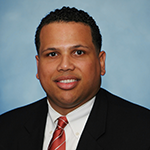A healthy skepticism of the government can be a good thing. That’s what Horacio Aldrete-Sanchez learned as a child growing up in Mexico. His father owned a business and often talked about how public policy affected his bottom line. But talking to his grandfather and uncle—an Army general and state governor—gave the young Aldrete-Sanchez a respect for public service. “I had a real working knowledge of public policy and administration with a strong focus on how it impacts the private sector,” he says. “I’m thankful that my outlook comes from a very balanced household.”
Fast-forward a few decades, and Aldrete-Sanchez is a managing director and lead analytical manager for Standard & Poor’s (S&P), where he researches and rates 18,000 cities, counties, school districts, and other debt issuers across the United States. Before accepting a position with S&P 15 years ago, he worked as a director of public debt in Mexico. Today, he leverages that experience in the public realm and lessons learned from interacting with his family of origin to make crucial decisions at a top international credit-reporting agency.
While Aldrete-Sanchez has moved to private work, he maintains a healthy respect for the public-private relationship and says his background helps him understand the often-delicate relationship between the two sectors as he works daily with state and local officials. “I often think back to the issues my father raised about how public policy makes a real difference in the life of a citizen and a business owner,” he explains. Aldrete-Sanchez uses his expertise to help issue debt in capital campaigns designed to improve communities. “I get to see the outcome,” he says. “I get to see real results and know that I’ve contributed in some small way to facilitate access to funds for cities to develop infrastructure. This work is very rewarding.”
It’s a process that Aldrete-Sanchez still enjoys after 15 years at S&P. Looking back, he can recall small border towns that were once nothing more than dirt roads and struggling businesses that are today home to major throughways, thriving commercial enterprises, and bustling technical colleges. At one point, those cities were just plans on a piece of paper until S&P stepped in to evaluate bonds to enable financing for each project.
Understandably, the economic crisis of 2008 has forever changed the ratings industry, which is now regulated by the Securities and Exchange Commission. Aldrete-Sanchez and his colleagues have worked to improve their ratings process to make it more transparent for investors who use S&P’s data as a tool to make decisions. The job is not to be taken lightly—Aldrete-Sanchez’s team determines the creditworthiness of thousands of municipalities. Four thousand of those ratings are for cities and counties, and S&P recently updated its rating criteria, making it more detailed and transparent. “We are reviewing each of 4,000 municipal ratings over the next year in a clear way that removes the mystery from our methodology,” Aldrete-Sanchez says. “This brings value to investors and shows that we are a trusted voice in the industry.”
Outside of work, Aldrete-Sanchez is a former board member and strong supporter of a Dallas-based program for underprivileged students called My Very Own Book, which places reading materials in the homes of low-income students throughout five area schools. He was attracted to the program after noticing gaps in public-sector services. “I was fortunate, because I could get books and education, but I grew up around kids that didn’t have that chance,” Aldrete-Sanchez says. By helping students take books home, he hopes to play a small part in providing the same kind of opportunities he felt lucky to have had throughout his early years.

